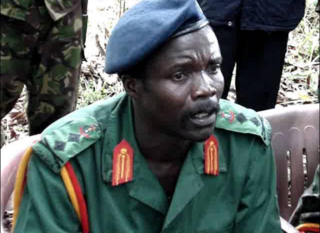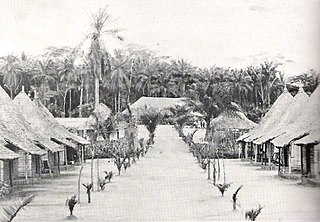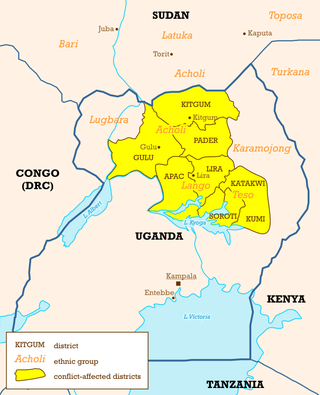
The Lord's Resistance Army insurgency is a conflict involving the Lord's Resistance Army against the government of Uganda. Following the Ugandan Civil War, militant Joseph Kony formed the Lord's Resistance Army and launched an insurgency against the newly installed President Yoweri Museveni. The stated goal was to establish a Christian state based on the Ten Commandments. Currently, there is low-level LRA activity in eastern areas of the Democratic Republic of the Congo and the Central African Republic. Kony proclaims himself the 'spokesperson' of God and a spirit medium.

Joseph Rao Kony is a Ugandan militant and warlord who founded the Lord's Resistance Army (LRA), designated as a terrorist group by the United Nations Peacekeepers, the European Union, and various other governments.

The Allied Democratic Forces is an Islamist rebel group in Uganda and the Democratic Republic of the Congo (DRC), considered a terrorist organisation by the Ugandan government. It was originally based in western Uganda but has expanded into the neighbouring DRC. Most Ugandan ADF fighters are Muslims from the Baganda and Basoga ethnic groups.

Isiro is the capital of Haut-Uele Province in the northeastern part of the Democratic Republic of the Congo. It lies between the equatorial forest and the savannah and its main resource is coffee. Isiro's population is estimated at approximately 182,000. Most people speak, Pa-Zande, Lingala, Swahili and which is somehow uncommon.
The Logo people or Logoa (plural) are an ethnic group of Nilotic origin who live predominantly in the north-east of the Democratic Republic of the Congo as well as parts of western Uganda and southern South Sudan. There are believed to be more than 200,000 people who identify as ethnically Logo of whom most live in the Congo's Faradje Territory, a remote region in Haut-Uélé Province, where they form the ethnic majority. Logo people also live in Watsa and Aba, both also in Haut-Uélé, and in Yei in South Sudan.

Dungu is a town in Haut-Uele Province located at the confluence of the Dungu and Kibali Rivers where they join to form the Uele River, south of the Garamba National Park. Dungu's terrain is wooded savannah, and its climate is tropical.
Marcus Terence Luke Bleasdale is a British photojournalist. His books include One Hundred Years of Darkness (2003), The Rape of a Nation (2009) and The Unravelling (2015). Bleasdale was appointed Companion of the Order of St Michael and St George (CMG) in the 2023 Birthday Honours for services to international photojournalism and human rights.

The Lord's Resistance Army (LRA) is a Christian extremist organization operating in Central Africa and East Africa. Its origins were in the Ugandan insurgency (1986–1994) against President Yoweri Museveni during which Joseph Rao Kony founded the LRA in 1987.

Ndoromo is a city in the northeastern regions of the Haut-Uele Province in the Democratic Republic of the Congo, adjacent to the border with South Sudan.

The 2008 Christmas massacres were a series of attacks in several villages in Haut-Uele District, DR Congo by the Lord's Resistance Army (LRA) on 24–27 December 2008

The Makombo massacre took place from 14 to 17 December 2009 in the Haut-Uele District of Democratic Republic of the Congo in the village and region of Makombo. Human Rights Watch (HRW) believes the attacks, which killed 321 people, were perpetrated by the Lord's Resistance Army (LRA), which denied responsibility.
The Democratic Republic of the Congo (DRC) is a source and destination country for men, women, and children subjected to trafficking in persons, specifically conditions of forced labor and forced prostitution. The majority of this trafficking is internal, and much of it is perpetrated by armed groups and government forces outside government control within the DRC's unstable eastern provinces.
Niangara Territory is an administrative region in the Haut-Uele province of the Democratic Republic of the Congo. Its headquarters is the town of Niangara, lying on both sides of the Uele River.
Watsa Territory is an administrative area in the Haut-Uele province of the Democratic Republic of the Congo. The administrative center is the town of Watsa.

Faradje is a town in the Haut-Uele province of the Democratic Republic of the Congo and is the administrative center of Faradje Territory. It lies on the Dungu River.

Bas-Uélé is one of the 21 new provinces of the Democratic Republic of the Congo created in the 2015 repartitioning. Bas-Uélé, Haut-Uélé, Ituri, and Tshopo provinces are the result of the dismemberment of the former Orientale Province. Bas-Uélé was formed from the Bas-Uele District whose town of Buta was elevated to capital city of the new province.
The Land Forces, also called the Congolese Army, are the land warfare component and the largest branch of the Armed Forces of the Democratic Republic of the Congo (FARDC).

Haut-Uele District was a district of the Belgian Congo and the Democratic Republic of the Congo. It was formed from part of Uele District in 1912. It roughly corresponded in area to the present Haut-Uélé province.
The Duru River is a river of the Haut-Uélé province of the Democratic Republic of the Congo. It is a right tributary of the Uele River.
Bangadi is a town located in Haut-Uele Province, Democratic Republic of the Congo.












